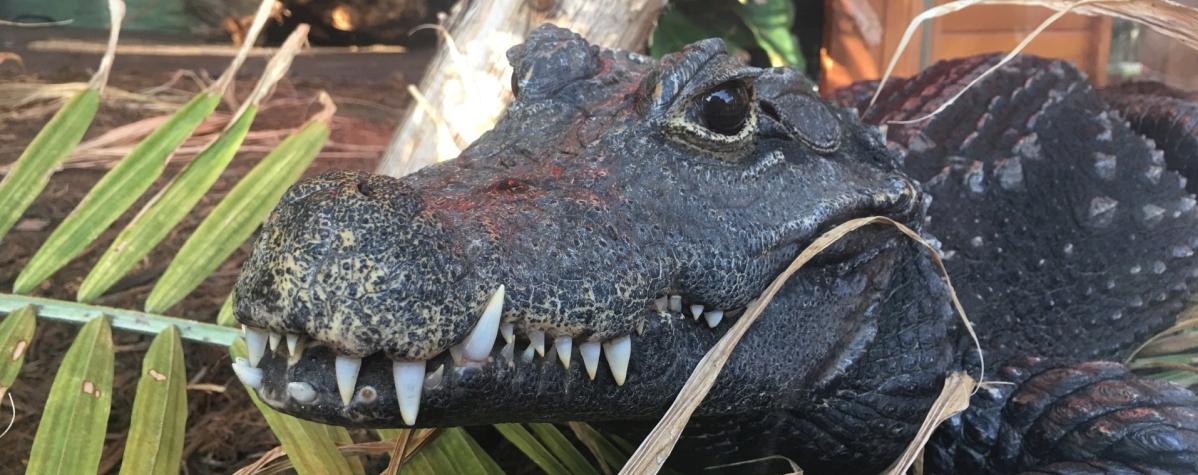West African Dwarf Crocodile
Scientific Classification 
|
Species |
Osteolaemus tetraspis tetraspis
|
| Kingdom | Animalia |
| Phylum | Chordata |
| Class | Reptilia |
| Order | Crocodylia |
| Family | Crocodylidae |
| IUCN Status | Vulnerable |
Appearance and lifespan
West African Dwarf Crocodiles are one of the smallest of the crocodilians, and the smallest true crocodile species. This species of crocodile, can sometimes reach 1.6 m (5.2 ft) in length and females are typically smaller than males. They have distinctively thick skin made of scales and strong prominences, which are known as osteoderms. Their snouts are short and blunt. This species of crocodile weighs on average 18 to 31kg (39 to 68 lbs).
The West African Dwarf Crocodiles has a life span of up to 75 years.
Behavior and reproduction
Like all reptiles, to maintain their body temperature, they bask in the sun to warm up and seek shade or water to cool down. This species can climb and will often climb up to a log or low branches to bask in the sun.
West African dwarf Crocodiles reach sexual maturity at 5 to 6 years old but generally, readiness to mate is determined by size. Females typically lay an average clutch of 10 to 14 hard-shell eggs, though up to 21 has been recorded. The eggs are then incubated for approximately 100 days. The temperature at which a crocodile egg is incubated at will determine if the hatchlings are males or females.
The females guard their nests, which is typically made of rotting plant material, from multiple predators. Young are typically 28 cm (11 in) in length when they hatch and are lighter in colour they begin to turn black in colour once they become juveniles.
Ecology and conservation
They are found mainly in swamps and swampy forests, since they enjoy slow-moving bodies of water. They typically swallow their food whole. Their diet consists of fish, crustaceans and amphibians. Prey that is too large to swallow is ripped into pieces before it is ingested. Young Dwarf Crocodiles eat worms, insects, tadpoles and small fish while the adults will prey on small mammals, reptiles, amphibians and birds
Food at the Zoo
At the zoo, the dwarf crocodiles are fed twice a week. Their diets consist of rats, chicken and commercial crocodile pellets.
Threats
Currently, numbers are estimated at 25,000 to 100,000 individuals in the wild. Their conservation status is Vulnerable on IUCN.
Main threats to West African crocodiles are habitat destruction and bush meat consumption. Due to the non-aggressive temperament of this species and the smaller size they are more popular for hunting.
Did you know?
- West African Dwarf Crocodile’s lost teeth are replaced throughout their life, which means they are polyphydonts.
- Crocodiles can see underwater using their special see-through eyelids known as the nictitating membrane.
- Crocodiles can stay under water for up to an hour.


